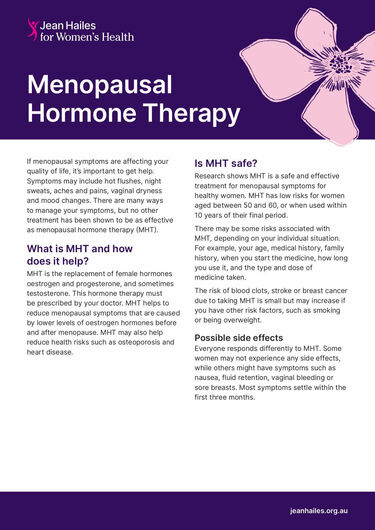“Are hormones right for me?
Why? What are the benefits?
What are the serious risks and common side effects?”1
Umbrella
What may the Hormone Therapy Questions To Ask Umbrella include?
Depending on the Source (DotS) this Umbrella may include:
- Hormone Replacement Therapy (HRT) Questions To Ask
- Hormone Therapy (HT) Questions To Ask
- Menopausal Hormone Therapy (MHT) Questions To Ask
- Menopause and Hormones Common Questions
- Menopause and Hormones Questions To Ask Your Doctor
Questions
What are questions to ask about hormone therapy (HT)?
In Menopause: Medicines To Help You: Important Questions To Ask About Menopause Hormone Medicines the (United States) Food and Drug Administration’s (FDA) include:

- “Are hormones right for me? Why?
- What are the benefits?
- What are the serious risks and common side effects?
- How long should I use hormone therapy?
- What is the lowest dose that will work for me?
- Are there any non-hormone medicines that I can take?”2
In the NICE Guideline Menopause: Diagnosis and Management – Information for the Public: Questions To Ask About Menopause – Treatment for Menopausal Symptoms the (British) National Institute for Health and Care Excellence (NICE), include these and more questions:
- “What types of treatment are suitable for my symptoms?
- What are the benefits and risks of different treatments?
- Are there any complementary therapies that could help?
- I use complementary therapies for my symptoms – are these safe to take alongside other treatments?
- If I already take an antidepressant, will that affect any treatments I can try for mood changes during menopause?
- Can you tell me why you are recommending hormone replacement therapy (HRT)?
- If I don’t want to take HRT, or can’t for medical reasons, what other treatments are there?…”.3
In Menopause Treatment: Questions For Your Healthcare Provider the (United States) Endocrine Society include:
- “What do you think are possible triggers for my hot flashes?
- Are there any lifestyle or dietary interventions that may diminish my symptoms?
- Should I consider medication for treatment of my symptoms? Hormonal or non-hormonal?
- If you are interested in hormonal therapy: Am I a good candidate for hormonal therapy, specifically are my cardiovascular and breast cancer risks low?
- Which lifestyle changes can I make that will decrease my menopause symptoms without medicine?
- Are there any alternative medicine treatments you would recommend I try for relief of my menopause symptoms?
- Are there any alternative medicines I should not use because they could interfere with medicines I take?”4
Risk Questions
What are some questions to ask about HT risks?
In Hormone therapy: Is It Right for You? Who Can Benefit From Hormone Therapy? If You Take Hormone Therapy, How Can You Reduce Risk? the (United States) Mayo Clinic elaborate on:
- Find the best product and delivery method for you. You can take estrogen in the form of a pill, patch, gel, vaginal cream, or slow-releasing suppository or ring that you place in your vagina…
- Minimize the amount of medication you take…
- Seek regular follow-up care…
- Make healthy lifestyle choices…
If you haven’t had a hysterectomy and are using systemic estrogen therapy, you’ll also need progestin. Your doctor can help you find the delivery method that offers the most benefits and convenience with the least risks and cost”.5
Vaginal Symptoms
Can HT options vary for vaginal symptoms?
In Hormone therapy: Is It Right for You? Who Can Benefit From Hormone Therapy? If You Take Hormone Therapy, How Can You Reduce Risk? the Mayo Clinic note:
Duration
How long can HT be used for?
On page two in the The North American Menopause Society Releases Its 2022 Hormone Therapy Position Statement, published 07 July 2022, the North American Menopause Society include:

- “Hormone therapy does not need to be routinely discontinued in women aged older than 60 or 65 years and can be considered for continuation beyond age 65 for persistent VMS, quality-of-life issues, or prevention of osteoporosis after appropriate evaluation and counseling of benefits and risks
- For women with GSM, vaginal estrogen (and systemic if required) or other nonestrogen therapies may be used at any age and for extended duration, if needed”.7
Health Care Provider
How important is it to review treatment options on a regular basis?
In Hormone therapy: Is It Right for You? The Bottom Line: Hormone Therapy Isn’t All Good or All Bad the (United States) Mayo Clinic elaborate on:
As researchers learn more about hormone therapy and other menopausal treatments, recommendations may change. If you continue to have bothersome menopausal symptoms, review treatment options with your doctor on a regular basis”.8
Health Topics A-Z
Where may I find Health Topics A-Z related to Hormone Therapy Questions To Ask?
In Health Topics A-Z you may find:
Links
Where may I find Links related to Hormone Therapy Questions To Ask?
Your Country may have Links similar to:
Links
This Links List to third party websites is neither comprehensive nor exhaustive. Inclusion on this Links List does not imply endorsement or recommendation. Non-inclusion on this Links List does not imply non-endorsement or non-recommendation. Third party websites are not under the control of Meno Martha International Menopause Directory. Third party websites may contain explicit medical images and/or sexual references. Please read Meno Martha International Menopause Directory’s Links Policy before proceeding to a Link. Please contact Webmaster if you experience a problem with a Link.New or Updated
- Dr Louise Newson: The Truth About the Menopause & HRT
- Menopause: Understanding the Changes and Finding Relief | Dr Susan Davis | The Proof Podcast EP 256
- Nonhormone Treatments for Hot Flashes and Night Sweats
- The 2023 Practitioner’s Toolkit for Managing Menopause [December 2023]
- Video Series-2023: Premature and Early Menopause
- Webinars: Previous – Approach To Bone Health In the Perimenopause and Postmenopause? [January 2024]
- 8 Myths and Truths About Menopausal Hot Flashes
- Askearlymenopause.org [Ask EM] [+ Video: What Is Early Menopause?]
- BMS & WHC’s 2020 Recommendations on Hormone Replacement Therapy In Menopausal Women
- BMS Statement on Testosterone
- BMS TV: Bioidentical Hormones
- BMS TV: HRT and Bleeding
- BMS TV: HRT and Breast Cancer: Overall Risks and Benefits
- BMS TV: HRT and the Risk of Breast Cancer
- BMS TV: Hormone Replacement Therapy (HRT)
- BMS TV: Testosterone Explained
- BMS TV: Urogenital Atrophy
- Bioidentical Hormone Therapy
- Bioidentical Hormones: Are They Safer?
- Deciding About Hormone Therapy
- Deciding About Hormone Therapy Use
- Dr Louise Newson: The Truth About the Menopause & HRT
- Endometrial Safety of Low-Dose Vaginal Estrogens
- Endometrial Safety of Low-Dose Vaginal Estrogens [Video]
- FAQs: Hormone Therapy for Menopause
- Find A Menopause Practitioner [United States and Other]
- Find An AMS Doctor [Australasian Menopause Society i.e. Australia and New Zealand]
- Find Your Nearest BMS Menopause Specialist [British Menopause Society]
- HRT
- HRT & Menopause Extra
- HRT – Types, Doses and Regimens
- HRT: Benefits and Risks
- Hormone Replacement Therapy (HRT)
- Hormone Replacement Therapy (HRT) With Dr Nicky Peel & Prof. David Armstrong
- Hormone Replacement Therapy (HRT): Side Effects of Hormone Replacement Therapy (HRT)
- Hormone Replacement Therapy (HRT): Types of Hormone Replacement Therapy (HRT)
- Hormone Therapy In Postmenopausal Persons: Primary Prevention of Chronic Conditions
- Hormone Therapy: Is It Right for You?
- Hot Flashes
- Hot Flashes: What Can I Do? [+ Video: What Are the Signs and Symptoms of Menopause?]
- How To Find Relief for Hot Flashes At Night
- I Forgot To Ask the Doctor – E9: The Menopause: Can Every Woman That Wants It Have HRT?
- Joint Position Statement By the British Menopause Society, Royal College of Obstetricians and Gynaecologists and Society for Endocrinology on Best Practice Recommendations for the Care of Women Experiencing the Menopause
- Later Years (Around 50 Years and Over): Menopause and Post Menopause Health – Hormone Replacement Therapy (HRT) [+ Video: Is HRT Bad for You?]
- Mayo Clinic Minute: Help With Hot Flashes Due To Menopause [+ Video Courtesy: Mayo Clinic News Network]
- Menopausal Hormone Therapy
- Menopausal Hormone Therapy
 Menopausal Hormone Therapy and Breast Cancer Risk
Menopausal Hormone Therapy and Breast Cancer Risk- Menopausal Hormone Therapy and Venous Thromboembolism
- Menopausal Hormone Therapy and Women’s Health: An Umbrella Review
- Menopausal Hormone Therapy, Heart Disease and Stroke
- Menopausal Hormone Therapy: What Is MHT and How Does it Help?
- Menopausal Hormone Therapy: Is MHT Safe?
- Menopause
- Menopause
- Menopause
- Menopause
- Menopause Hormone Therapy: Does It Cause Vaginal Bleeding?
- Menopause Management Options: Menopausal Hormone Therapy (MHT)
- Menopause Map: Downloadable Resources – My Personal Path Print Tools: Questions for Your Health Care Provider

- Menopause Patient Information [Videos] 3. The Risks & Benefits of HRT
- Menopause Patient Information [Videos] 4. The Different Types of HRT
- Menopause Preparedness Toolkit Video Series: Treating Vasomotor Symptoms of Menopause
- Menopause Symptoms: Mayo Clinic Expert Outlines Hormone and Nonhormonal Therapies
- Menopause Treatments: What Works, What Doesn’t
- Menopause and HRT
- Menopause, Perimenopause, Hormone Therapy and Other Treatments With Madelyn Butler, MD [Podcast]
- Menopause: Diagnosis and Management – Information for the Public: Questions To Ask About Menopause [NICE Guideline]
- Menopause: Ensuring A Tranquil Transition
- Menopause: Medicines To Help You: Important Questions To Ask About Menopause Hormone Medicines
- Menopause: Things You Can Do
- Menopause: Understanding the Changes and Finding Relief | Dr Susan Davis | The Proof Podcast EP 256
- Mymenoplan.org [My Menoplan, United States]
- Navigating Menopause: Expert Insights and Solutions | Dr Susan Davis | The Proof Podcast EP 245
- Non-Estrogen Treatments for Menopausal Symptoms
 Nonhormone Treatments for Hot Flashes and Night Sweats
Nonhormone Treatments for Hot Flashes and Night Sweats- Perimenopause
- Perimenopause
- Perimenopause and Menopause Symptom Checklist
- Risks and Benefits of MHT
- Testosterone Therapy In Women: Does It Boost Sex Drive?
- The 2022 Hormone Therapy Position Statement of The North American Menopause Society
- The 2023 Practitioner’s Toolkit for Managing Menopause
- The Truth About Menopause Supplements | Dr Sarah Berry
- Therapy for the Effects of Menopause
- Tibolone
- Tips To Help Manage Menopause Symptoms
- UCalgary Research Reveals Importance of Route of Administration of Menopausal Hormone Therapy
- Vaginal Dryness
- Vaginal Dryness After Menopause: How To Treat It?
- Vaginal Dryness: What To Do About It
- Vaginal Oestrogen
- Video Series-2022: Hormone Therapy: Understanding the Risks and Benefits
- Video Series-2023: Lifestyle Modification and Prevention of Breast Cancer
- Video Series-2023: NAMS 2023 Nonhormone Therapies Position Statement for Bothersome Menopause Symptoms
- Video Series-2023: New FDA-Approved Nonhormone Option for the Treatment of Hot Flashes
- Video Series-2023: Premature and Early Menopause
- Video: Leslie Cho, MD, Discusses CV Risks, Benefits of Menopausal Hormone Therapy
- Videos and Podcasts: Videos – Interviews: A Simple Approach To Menopause: The Menopause Quick Six (www.MQ6.ca)
- Videos and Podcasts: Videos – Interviews: Heart Disease, Risk Factors of Developing Heart Disease, and Can I Take Hormones?
- Videos and Podcasts: Videos – Interviews: Prevention of Chronic Diseases – Where Does HRT Fit In?
- Videos and Podcasts: Videos – Interviews: The Women’s Health Initiative – What Can We Believe?
- Webinars: Previous – Approach To Bone Health In the Perimenopause and Postmenopause?
- Webinars: Previous – Brain Teasers: Challenges In the Cranium
- Webinars: Previous – Clinical Climacteric Conundrums
- Webinars: Previous – Management of Menopause In Patients With Obesity
Sources
Where may I find the Sources quoted?
You may find the Sources quoted at:
Sources
- Menopause: Medicines To Help You – Important Questions To Ask About Menopause Hormone Medicines. Content Current As of: 22 August 2019. Food and Drug Administration https://www.fda.gov/ForConsumers/ByAudience/ForWomen/ucm118627.htm Accessed: 23 January 2024
- Menopause: Medicines To Help You – Important Questions To Ask About Menopause Hormone Medicines. Content Current As of 22 August 2019. Food and Drug Administration https://www.fda.gov/ForConsumers/ByAudience/ForWomen/ucm118627.htm Accessed: 23 January 2024
- Menopause: Diagnosis and Management – Information for the Public: Questions To Ask About Menopause – Treatment for Menopausal Symptoms. Published Date: 12 November 2015. Last Updated: 05 December 2019. National Institute for Health and Care Excellence https://www.nice.org.uk/guidance/NG23/ifp/chapter/Questions-to-ask-about-menopause Accessed: 23 January 2024
- Menopause Treatment: Questions for Your Healthcare Provider. Last Updated: 24 January 2022. Endocrine Society https://www.endocrine.org/patient-engagement/endocrine-library/menopause-treatment Accessed: 23 January 2024
- Hormone therapy: Is It Right for You? Who Can Benefit From Hormone Therapy? If You Take Hormone Therapy, How Can You Reduce Risk? 06 December 2022. Mayo Clinic https://www.mayoclinic.org/diseases-conditions/menopause/in-depth/hormone-therapy/art-20046372 Accessed: 23 January 2024
- Hormone therapy: Is It Right for You? Who Can Benefit From Hormone Therapy? If You Take Hormone Therapy, How Can You Reduce Risk? 06 December 2022. Mayo Clinic https://www.mayoclinic.org/diseases-conditions/menopause/in-depth/hormone-therapy/art-20046372 Accessed: 23 January 2024
- The North American Menopause Society Releases Its 2022 Hormone Therapy Position Statement
Menopause. 07 July 2022:2. North American Menopause Society https://www.menopause.org/docs/default-source/press-release/ht-position-statement-release.pdf Accessed: 23 January 2024 - Hormone therapy: Is It Right for You? Hormone Therapy Isn’t All Good or All Bad. 06 December 2023. Mayo Clinic https://www.mayoclinic.org/diseases-conditions/menopause/in-depth/hormone-therapy/art-20046372 Accessed: 23 January 2024



